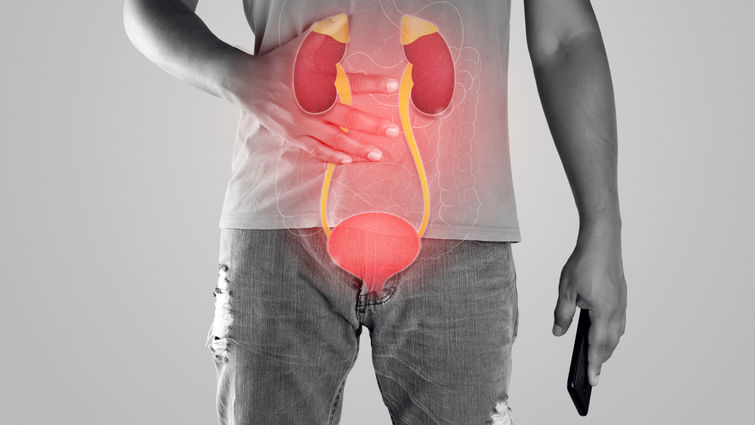

Over 80,000 individuals will be diagnosed with bladder cancer this year, according to the American Cancer Society’s estimate. Unfortunately, no official guidelines for preemptive bladder cancer screening exist. For this reason, Herbert Ruckle, MD, FACS, chair of Loma Linda University Health’s Urology Department, says each person should remain vigilant for the signs and symptoms linked to bladder cancer and know how to take action accordingly.
For May’s Bladder Cancer Awareness Month, Ruckle reviews two common signs of bladder cancer and how to act upon them to secure maximal quality and length of life.
Two major indicators that may signal bladder cancer (cancer originating in the “skin surface” of the bladder) are the presence of blood in the urine, known as hematuria, and changes in urination patterns or sensations.
If you spot blood in your urine, called gross hematuria, Ruckle advises visiting your doctor as soon as possible and discussing the issue with them — even if it happened once or goes away. Gross hematuria is not always continuous, Ruckle says, meaning it may occur and then disappear for up to months at a time before returning, if ever.
Read: What does visible or microscopic blood in my urine mean?
“I often hear those diagnosed with bladder cancer recall, ‘I didn’t think anything of the bleeding because it went away, and I wasn't in any other pain,’” says Ruckle. “But not seeking medical care after experiencing this symptom could mean a missed or delayed diagnosis if it is bladder cancer.”
Ruckle emphasizes the importance of sharing your observations with a care provider so that they may investigate the cause and suggest appropriate remedies. If the symptoms are from bladder cancer, Ruckle says early diagnosis is crucial — ideally before the cancer has spread and when treatment is less intense.
The second most common sign of bladder cancer involves changes in urination habits or sensation, including but not limited to:
- Dysuria — a feeling of pain such as burning or irritation during urination
- Voiding symptoms — sensations of lower urinary tract pain and bother that may manifest in a variety of ways:
- Frequency — urinating over eight times daily or more than usual when drinking the same amount of fluid
- Urgency — a strong and difficult-to-control need to urinate
- Pain with urination and other irritative urination symptoms
Unlike gross hematuria, which may appear and disappear, abnormal urination symptoms tend to remain, Ruckle says.
If you experience any of the above symptoms, Ruckle urges you to consult your doctor. In order to obtain further information about what is happening in your body, your doctor should request a urine test, commonly known as a urinalysis. Even if you have not seen any blood in your urine, a urinalysis can be administered during a general checkup and picks up on microscopic hematuria.
Smoking tobacco significantly increases the risk of developing bladder cancer, Ruckle says, so smoking cessation is imperative in people who smoke.
“You help yourself so much when you get checked out at the first symptom rather than waiting for the issue to go away or incorrectly assuming a benign cause,” Ruckle says.
Ruckle says it is helpful to build your awareness of bladder cancer risk factors and discuss them with your doctor. While the symptoms described above are associated with various non-cancerous concerns, such as urinary tract infections, Ruckle says determining the root cause — cancerous or not — with guideline supported medical examination is vital.
If you receive a diagnosis of bladder cancer, Ruckle says there is hope through a variety of treatment options to enable a long, happy life.
“Bladder cancer is generally highly curable, and the medical community wields many tools that help extend length and quality of life in those diagnosed,” he says.
He adds the medical community continues to forge ahead in optimizing bladder cancer treatment, such as chemotherapy and various types of advanced immunotherapy.
“Tuning into your body, knowing the main symptoms of bladder cancer, and meeting with a doctor if anything feels unusual are the best steps to safeguard your health from this disease that can be detrimental if discovered too late,” Ruckle says. “Bladder cancer or not, you can work with your doctor to understand the cause of your symptoms and access the necessary treatments to get well.”
To learn more about the variety of services at Loma Linda University Cancer Center, visit lluh.org/cancer-center or call 800-782-2623.


